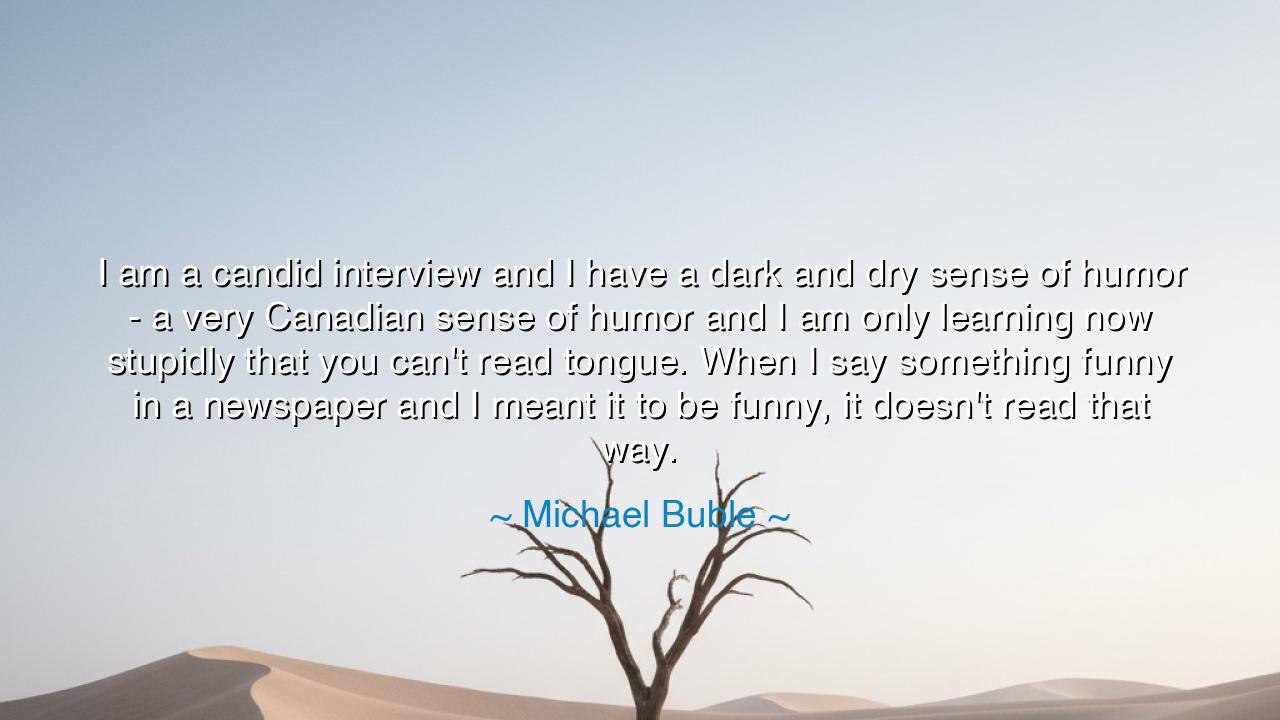
I am a candid interview and I have a dark and dry sense of humor
I am a candid interview and I have a dark and dry sense of humor - a very Canadian sense of humor and I am only learning now stupidly that you can't read tongue. When I say something funny in a newspaper and I meant it to be funny, it doesn't read that way.






In the words of Michael Bublé, “I am a candid interview and I have a dark and dry sense of humor — a very Canadian sense of humor — and I am only learning now, stupidly, that you can’t read tongue. When I say something funny in a newspaper and I meant it to be funny, it doesn’t read that way.”
This confession, humble and revealing, touches upon a truth older than language itself — that humor lives in tone, not in text, and that authenticity, though sacred, can be misunderstood when stripped of its voice. Bublé, a man known for his charm and wit, speaks here as an artist caught between expression and interpretation — the eternal struggle of every soul who dares to speak truthfully in a world that often hears selectively. His words remind us that communication, at its heart, is not the sharing of words, but the sharing of spirit.
When he says, “I am a candid interview,” he reveals both his gift and his burden. To be candid — to speak openly, without disguise — is to live honestly before the world. But candor, like light, exposes as much as it illuminates. It reveals the soul’s contours, its humor, its irony, and its heart. Yet, when filtered through the cold ink of a newspaper or the unfeeling screen of a device, that warmth can vanish. The “dark and dry sense of humor” that delights in conversation becomes distant on the page; the sparkle of irony becomes shadowed misunderstanding. What was meant as laughter can be mistaken for arrogance, and what was meant as humility can sound like jest.
The origin of this dilemma is ancient, born with the separation of voice from script. The poets of old understood that tone is the breath of meaning. When Socrates was misrepresented in writing by his rivals, he lamented that written words, unlike speech, cannot defend themselves. They sit silent as others project meaning upon them. In the same way, Bublé’s experience is the modern echo of that ancient truth — that when humor loses its “tongue”, it loses its humanity. The written word, though powerful, can never fully capture the warmth of a living voice.
To have a “Canadian sense of humor,” as Bublé describes, is to embody a kind of humility — humor that is self-deprecating, understated, and quietly clever. It is not loud or cruel, but playful, born of resilience and modesty. Yet such humor, when written, can appear detached or cold, for it thrives on tone, on pause, on raised eyebrows and soft laughter. The ancients would have called this the music of the soul — the unspoken rhythm that carries truth. To lose it is to lose half the meaning. Thus, when Bublé says, “You can’t read tongue,” he laments not just miscommunication, but the distance between hearts when words are robbed of voice.
There is a story told of Mark Twain, another master of dry humor, who once wrote a letter to a critic saying, “You misunderstood me entirely — I was only joking.” He, too, suffered from the loss of tone in print. Twain knew that humor is the art of timing and tone — the play between the serious and the absurd — and without that play, wit becomes weapon, and jest becomes judgment. His letters and essays remind us that the written word, for all its power, must be wielded with care, for what is sacred in laughter can turn to stone in misunderstanding.
Bublé’s reflection also speaks to the vulnerability of authenticity in the public world. The candid soul who speaks honestly often walks a lonely path, for honesty is easily twisted in translation. Yet he continues to speak — to be himself — because truth, even misunderstood, is nobler than silence born of fear. The ancients would have praised this as parrhesia — the courage to speak freely, to reveal one’s true self despite the risk of being misheard. His lament is not bitterness, but learning — the gentle realization that words must carry empathy as well as honesty if they are to be understood.
Thus, the teaching of Michael Bublé’s words is this: communication is not merely expression, but translation — the art of carrying one’s heart across the fragile bridge of language. Humor, especially, must be guided by empathy, for laughter shared without understanding becomes noise. If one must speak truth, let it be wrapped in gentleness; if one must laugh, let it be with love, not pride. And when one is misunderstood — as all are, at times — let patience, not anger, be the answer. For tone can be lost, but intention can always be restored through compassion.
And so, dear listener, remember Bublé’s lesson: “You can’t read tongue.” The world will not always hear your laughter as you mean it, nor see your sincerity behind your words. Yet speak and laugh anyway — with kindness, with humility, with faith that the truth of your heart will reach those meant to understand. For humor, like music, is not for the mind alone; it is for the soul — and even when it is misread, it still reveals the divine spark of humanity that dares to be both honest and joyful in an often humorless world.






AAdministratorAdministrator
Welcome, honored guests. Please leave a comment, we will respond soon